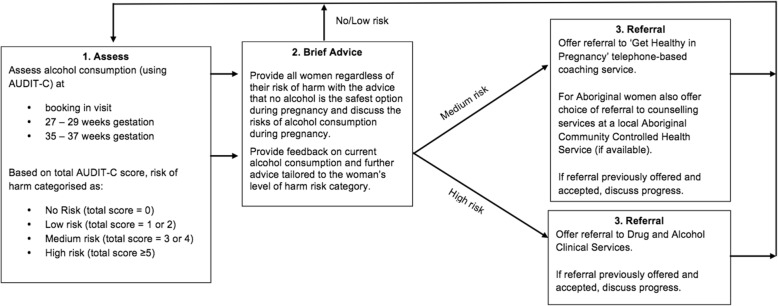Fig. 2.
Model of care for addressing maternal alcohol consumption during pregnancy. Figure 2 shows the model of care for addressing maternal alcohol consumption during pregnancy. This model of care will consist of three key elements—assessment, advice and referral—which will be delivered to women who attend an antenatal clinic appointment booking in, 27–29 weeks gestation and 35–37 weeks gestation. The Alcohol Use Disorders Identification Test Consumption (AUDIT-C) tool will be used to assess the alcohol consumption of pregnant women. All women, regardless of their Alcohol Risk of Harm category, will be provided with advice by their maternity clinician that it is best not to consume alcohol at any time during pregnancy and that alcohol consumption during pregnancy can increase risk of harm to the foetus and the woman. Women will be provided with additional advice based on their Alcohol Risk of Harm category. Women with a Medium AUDIT-C risk level will be offered a referral to the Get Healthy in Pregnancy telephone-based coaching service. Aboriginal women with a Medium AUDIT-C risk level will also be offered the option of referral to counselling services at a local Aboriginal Community Controlled Health Service (ACCHS) (if available). For women with a High AUDIT-C risk level, direct referral to Hunter New England Local Health District Drug and Alcohol Clinical Services will be provided. Care from such services will involve ongoing clinical support from a multidisciplinary Drug and Alcohol team throughout pregnancy, including assessment, brief intervention, counselling and withdrawal and post-withdrawal support as clinically indicated

